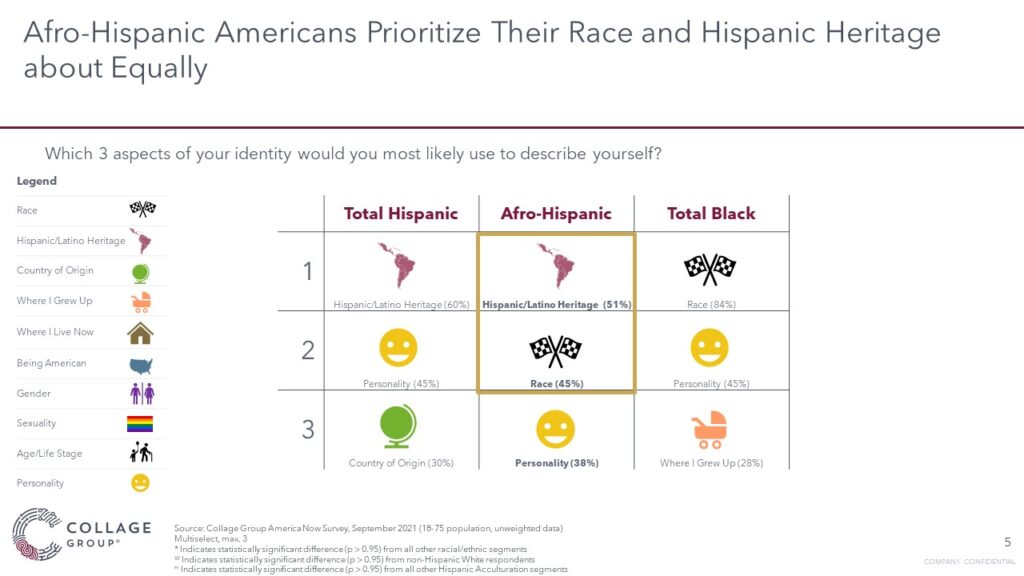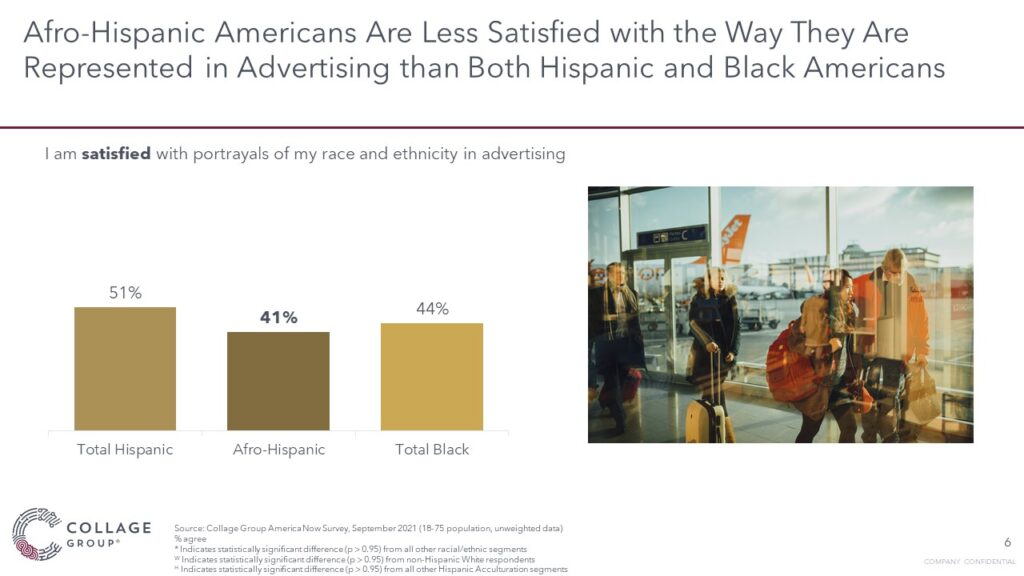America Now: Acculturation and Afro-Hispanic Identity

This research is part of a series that expands on our 2021 Roundtable Presentation, America Now. Read on to learn how acculturation and race impact Hispanic identity.
As more Americans embrace intersectional identities, you may be wondering what that means for the Hispanic population which is anything but monolithic. One of the most talked about intersections in recent years are Afro-Hispanics (sometimes referred to as Afro-Latinos), individuals with origins in Spanish speaking countries that identify as black or African American.
Fill out the form below to access a sample from our research presentation, America Now: How We Have Changed Since 2020.
According to recent data from the Pew Research Center, 15 percent of Hispanic adults self-describe as having darker skin. This proportion largely tracks with Collage Group’s data from September 2021, in which 22 percent of Hispanic respondents do not identify as “White” and about 12 percent identify as Black or African American.
Within this sub-set, Black Hispanics balance the importance of their racial identity and Hispanic heritage. Among respondents identifying as both Black and Hispanic, 45 percent – almost half – say their race is one of the most important components of the way they describe themselves. Just over half – 51 percent – say the same of their Hispanic or Latino heritage.

For these Black Hispanics, racial identity is important partially because they believe it puts them at a disadvantage in society. Pew finds that about 6 in 10 Hispanic adults agree that:
- Having a darker skin color hurts Latinos’ ability to get ahead
- Having a lighter skin color helps Latinos’ ability to get ahead
- Skin colors shape their daily lives and experiences
Given these high numbers, and recent controversies over colorism in the casting in productions like In the Heights and Crazy Rich Asians, it’s essential for brands to recognize the importance of diversity within multicultural segments. And it’s clear that Afro-Hispanic Americans aren’t impressed with how they’re currently being portrayed.

While a slim majority of Hispanic Americans say they’re satisfied with how their ethnicity is portrayed in advertisements, most Black Americans are not, and even fewer Afro-Hispanic Americans say they like what they see when it comes to seeing themselves in ads. Further, Afro-Hispanics’ dissatisfaction with their portrayals in advertisements demonstrates the importance of telling diverse, culturally-nuanced stories in marketing content. Even though a brand may be working towards creating content more inclusive of Hispanic and Black consumers, that might not translate to intersectional identity segments of Americans.
Here are three suggestions for marketing to consumers who navigate between their Black and Hispanic identities:
- Don’t make them choose. Black and Hispanic identity are both salient for this segment, but many feel “forced to choose” between their identities. Reinforce the empowering idea that they can identify as both fully Black and Hispanic.
- Find country-of-origin intersections. Many Caribbean and Latin American communities are predominantly Black, challenging American conceptions of race and ethnicity. Tell stories from their perspective to ensure they feel authentically portrayed.
- Be inclusive of the overlap. Black Hispanics are just as much part of the Black community as they are the Hispanic community. Represent this segment and their needs in marketing to both Black and Hispanic consumers.
Other Data Notes:
Among Biracial Hispanic/Black Americans, 58% say their race is important to their identity, while only 15% say their Hispanic/Latino heritage. Race is the most important identity consideration for this population, at 32%, and 13% say Hispanic/Latino heritage takes first spot.
Acculturation associates with increased importance of Ethnicity, lessened importance of race. Unacculturated/Bicultural Hispanics are MORE likely to say being Hispanic/Latino is important to them.
Gen X is most likely to say Hispanic/Latino heritage is the most important identity consideration (49%).
Source: Pew Research, “Majority of Latinos Say Skin Color Impacts Opportunity in America and Shapes Daily Life,” November 4, 2021
Get In Touch
Harness the power of cultural intelligence to win diverse America. Discover how you can turn insights into impact today! Contact us.